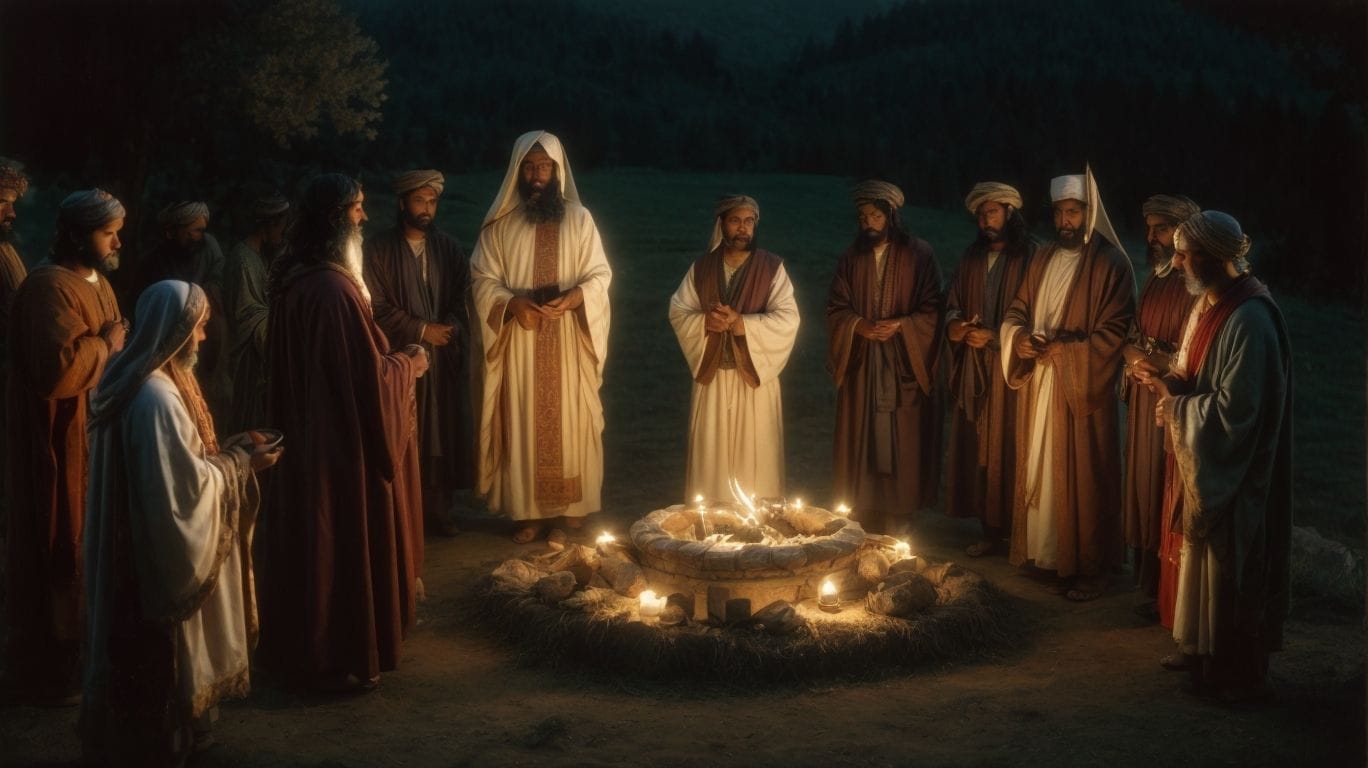The origins of Christianity can be traced back to the 1st century A.D. It emerged within the context of Judaism and was heavily influenced by its teachings and traditions. The life and teachings of Jesus are central to the founding of Christianity. According to the accounts in the New Testament, Jesus was born in Bethlehem, grew up in Nazareth, and began his ministry of preaching and teaching in his early thirties. His teachings emphasized love, compassion, forgiveness, and the coming of the Kingdom of God. However, his message and growing popularity garnered opposition, leading to his crucifixion. The belief in his resurrection further solidified the foundation of Christianity. Through the efforts of the apostles, who spread Jesus’s teachings, Christianity began to gain followers and expand beyond its Jewish roots. The early followers of Christianity faced persecution and martyrdom, which only strengthened their faith. However, Christianity experienced a significant turning point in the 4th century with the conversion of Roman Emperor Constantine and the issuing of the Edict of Milan, which granted religious freedom to Christians. This marked a period of growth and development for Christianity. During this time, important church councils, such as the Council of Nicaea, the Council of Ephesus, and the Council of Chalcedon, played a crucial role in the formulation of Christian doctrine and the establishment of the early church. These councils addressed key theological issues and shaped the belief system of Christianity, laying the foundation for the future development of the Christian faith.
Key takeaways:
- Christianity originated from early influences, including Judaism and the life and teachings of Jesus, such as his birth, ministry, crucifixion, and resurrection.
- The spread and growth of Christianity were facilitated by apostles, despite persecution and martyrdom, and was accelerated by the conversion of Constantine and the Edict of Milan.
- Early church councils such as the Council of Nicaea, Council of Ephesus, and Council of Chalcedon shaped the development of Christian doctrine, which established core beliefs about the nature of Christ and the hypostatic union.
The Origins of Christianity

Photo Credits: 777Legion.Com by Adam King
Discover the intriguing origins of Christianity and how early influences and Judaism shaped it. Delve into the rich historical context surrounding the birth of this influential religious movement. Uncover the fascinating events, figures, and beliefs that laid the groundwork for the development of Christianity. Explore the connections between Christianity and its roots in Judaism, gaining insights into the shared elements and influences that shaped both faiths. Journey back in time to uncover the captivating story of the origins of Christianity.
Early Influences and Judaism
Early Influences and Judaism played a crucial role in the origins of Christianity. Judaism, with its historical and cultural background, laid the foundation for the emergence of Christianity. The initial followers of Jesus were predominantly Jewish, perceiving him as the fulfillment of Jewish prophecies. The beliefs and practices of the early Christian community were deeply rooted in the Jewish scriptures, teachings, and traditions. Jesus grew up in a Jewish household, and Jewish customs and teachings profoundly shaped his ministry. The strong connection to Judaism paved the way for the development of Christian theology and the propagation of Christianity among Jewish and Gentile communities.
The Life and Teachings of Jesus

Photo Credits: 777Legion.Com by Russell Walker
Delve into the captivating life and teachings of Jesus, where his impactful journey unfolds before us. Witness the extraordinary events that shape his narrative, from his birth and early life to the powerful ministry and preaching that captivated multitudes. Brace yourself as we uncover the climactic crucifixion and resurrection, revealing the depths of his profound influence on Christianity. Prepare to be astonished by the incredible stories that lie within this remarkable section.
Birth and Early Life
The birth and early life of Jesus are integral parts of the Christian faith. According to the Bible, Jesus was born in Bethlehem to a virgin named Mary and her husband Joseph. His birth, which occurred in Bethlehem, is celebrated on Christmas Day. Jesus grew up in Nazareth as a child and worked as a carpenter. There are limited historical accounts of Jesus’ early life, and much of the information comes from religious texts. The significance of Jesus’ birth lies in his role as the savior and the fulfillment of prophecies in the Old Testament.
Ministry and Preaching
Ministry and preaching played a vital role in the development and propagation of Christianity.
- Jesus’ ministry encompassed preaching and teaching his followers about the Kingdom of God.
- He embarked on journeys throughout the region, sharing his message and performing astonishing miracles.
- His teachings centered around love, forgiveness, and salvation.
- After the Crucifixion and resurrection of Jesus, his disciples carried forward his ministry.
- They preached his message and established churches in various cities.
- Through their preaching, Christianity flourished and attracted numerous followers.
- Today, ministry and preaching are fundamental to practicing and disseminating the Christian faith.
Crucifixion and Resurrection
The Crucifixion and Resurrection are pivotal events in the history of Christianity. Jesus’ crucifixion took place in Jerusalem, under Roman rule, as a form of punishment. It is believed that Jesus sacrificed his life for the sins of humanity. According to Christian belief, Jesus was resurrected from the dead three days later, demonstrating his divine nature and triumph over death. This event is celebrated on Easter Sunday. The Crucifixion and Resurrection serve as the foundation of Christian faith, symbolizing redemption, forgiveness, and hope for believers. These events have profoundly impacted the development and spread of Christianity throughout history.
The Spread and Growth of Christianity

Photo Credits: 777Legion.Com by Ethan King
From the early days of Christianity, its growth and spread have been marked by remarkable events and influential figures. In this section, we’ll dive into the fascinating journey of Christianity, exploring the pivotal role of apostles, the trials and triumphs of persecution and martyrdom, and the transformation brought about by the conversion of Constantine and the issuance of the Edict of Milan. Join us as we uncover the captivating story behind the global rise of one of the world’s largest religions.
The Role of Apostles
The crucial part played by apostles in the spread and growth of Christianity cannot be overstated. Chosen directly by Jesus himself, these individuals were given the important task of disseminating his teachings and establishing churches. They witnessed Jesus’ life, death, and resurrection and were leaders and mentors to the early Christian communities. Prominent apostles like Peter, Paul, and John embarked on extensive travels, tirelessly preaching the Gospel, performing miracles, and appointing new leaders. Their unwavering faith and dedication formed the bedrock of the Christian faith, shaping its early development and inspiring future generations of believers.
The role of apostles held immense significance in the formative years of Christianity, influencing its growth and shaping its doctrines. Their contributions continue to reverberate and make a lasting impact on the faith and its adherents to this very day. For more information on when Christianity started, please visit this reputable source.
For those interested in delving deeper into the captivating history of Christianity, it is recommended to explore books such as “The Apostle: A Life of Paul” by John Pollock or “Paul: A Biography” by N.T. Wright. These valuable resources provide an enriching understanding of the pivotal role apostles played in the development of Christianity. Enjoy your enlightening read!
Persecution and Martyrdom
During its early years, Christianity encountered severe persecution and witnessed numerous acts of martyrdom. This persecution was largely a result of Christianity’s rejection of the traditional Roman gods and refusal to participate in state-sponsored religious practices. Christians were perceived as adversaries of the state and experienced imprisonment, torture, and death. Emperor Nero’s reign is particularly noteworthy as he accused Christians of starting the Great Fire of Rome in 64 A.D. and imposed brutal punishments on them. Despite facing such hardships, the unwavering faith of early Christians and their willingness to sacrifice their lives for their beliefs played a significant role in the propagation and advancement of Christianity.
Conversion of Constantine and the Edict of Milan
The Conversion of Constantine and the Edict of Milan played a vital role in the development of Christianity. In 312 AD, Constantine, the Emperor of Rome, embraced Christianity following a remarkable celestial vision of the Chi-Rho symbol before a significant battle. This incident brought about a remarkable change in the Roman Empire‘s perception and support of Christianity. In 313 AD, Constantine issued the Edict of Milan, allowing Christians religious tolerance and freedom. This decree ended the persecution faced by Christians, enabling them to practice their faith openly. The Conversion of Constantine and the Edict of Milan emerged as decisive catalysts in the expansion and advancement of Christianity throughout the Roman Empire.
Development of Christian Doctrine and Early Church Councils

Photo Credits: 777Legion.Com by Philip Thomas
The development of Christian doctrine and early church councils unveil pivotal moments in the history of Christianity. Get ready to dive into the rich tapestry of the Council of Nicaea and the Nicene Creed, the Council of Ephesus and the Nature of Christ, and the Council of Chalcedon and the Hypostatic Union. Discover the intricate debates, theological nuances, and profound impacts these councils had on forming Christian beliefs. Brace yourself for a journey through the foundations of Christian thought and doctrine.
The Council of Nicaea and the Nicene Creed
The Council of Nicaea, held in 325 AD, was a significant event in the development of Christianity. During this Council, church leaders came together to address theological disputes, particularly the nature of Jesus and the concept of the Trinity. One of the key outcomes of the Council was the formulation of the Nicene Creed, which affirmed the divinity of Jesus and his consubstantiality with the Father. This creed became a central statement of Christian faith and is still recited in many churches today. The Council also addressed other matters, such as the date of Easter and the role of bishops. It played a crucial role in shaping the future of Christianity. As a true story, during the Council, there were intense debates and disagreements among the bishops, highlighting the significance and complexity of the theological discussions.
The Council of Ephesus and the Nature of Christ
The Council of Ephesus played a significant role in defining the nature of Christ within Christianity. The Council of Ephesus and the Nature of Christ was held in 431 AD and addressed the controversy surrounding the teachings of Nestorius, who believed that Christ was two separate persons, one divine and one human. The Council of Ephesus declared Nestorius’s teachings heretical and affirmed that Christ is one person with two natures – fully divine and fully human. This doctrine, known as the Hypostatic Union, became a foundational belief in Christianity. The Council of Ephesus reinforced the understanding of Christ’s nature and solidified the theological framework for future discussions on Christology.
The Council of Chalcedon and the Hypostatic Union
The Council of Chalcedon in 451 AD left a lasting impact on Christian doctrine by addressing the Christological controversy and defining the nature of Christ. At its core, the Council emphasized the importance of the hypostatic union. This union affirms that Jesus possesses a fully divine and human nature without blending, altering, or separating the two. Orthodox Christianity adopted this doctrine as a crucial aspect of its belief system, establishing clear boundaries for acceptable faith. Even today, the Council of Chalcedon and its proclamation of the hypostatic union profoundly shape Christian theology and our understanding of Christ’s nature.
Some Facts About When Christianity Started:
- ✅ Christianity is approximately 2,000 years old. (Source: Patheos)
- ✅ The Gregorian calendar, introduced in 1582, estimates the time since Jesus’ birth and the beginning of Christianity. (Source: Patheos)
- ✅ Christianity did not immediately emerge as a fully formed religion after Jesus’ birth but developed over time. (Source: Patheos)
- ✅ Christianity is defined by the death and resurrection of Jesus, which separates it from other Abrahamic religions. (Source: Patheos)
- ✅ Christianity became its religion by the second century. (Source: Wikipedia)


